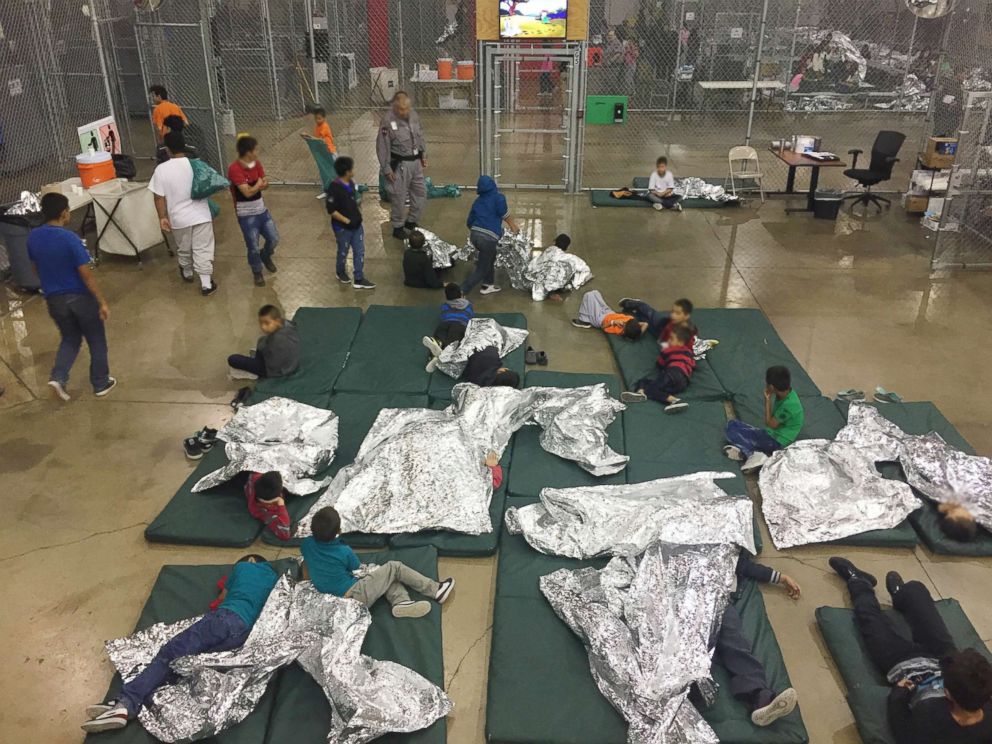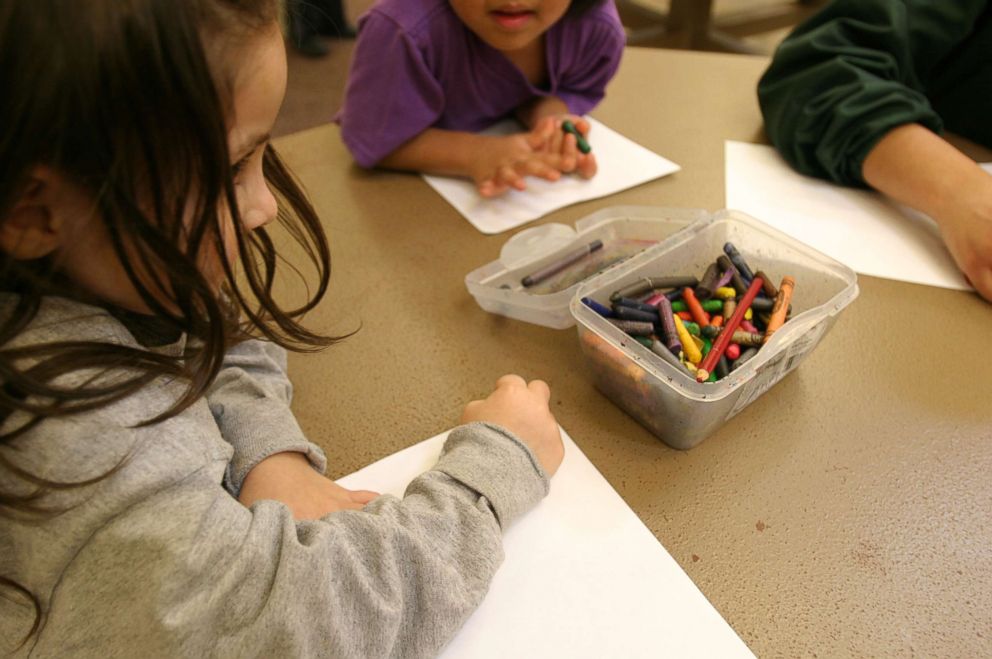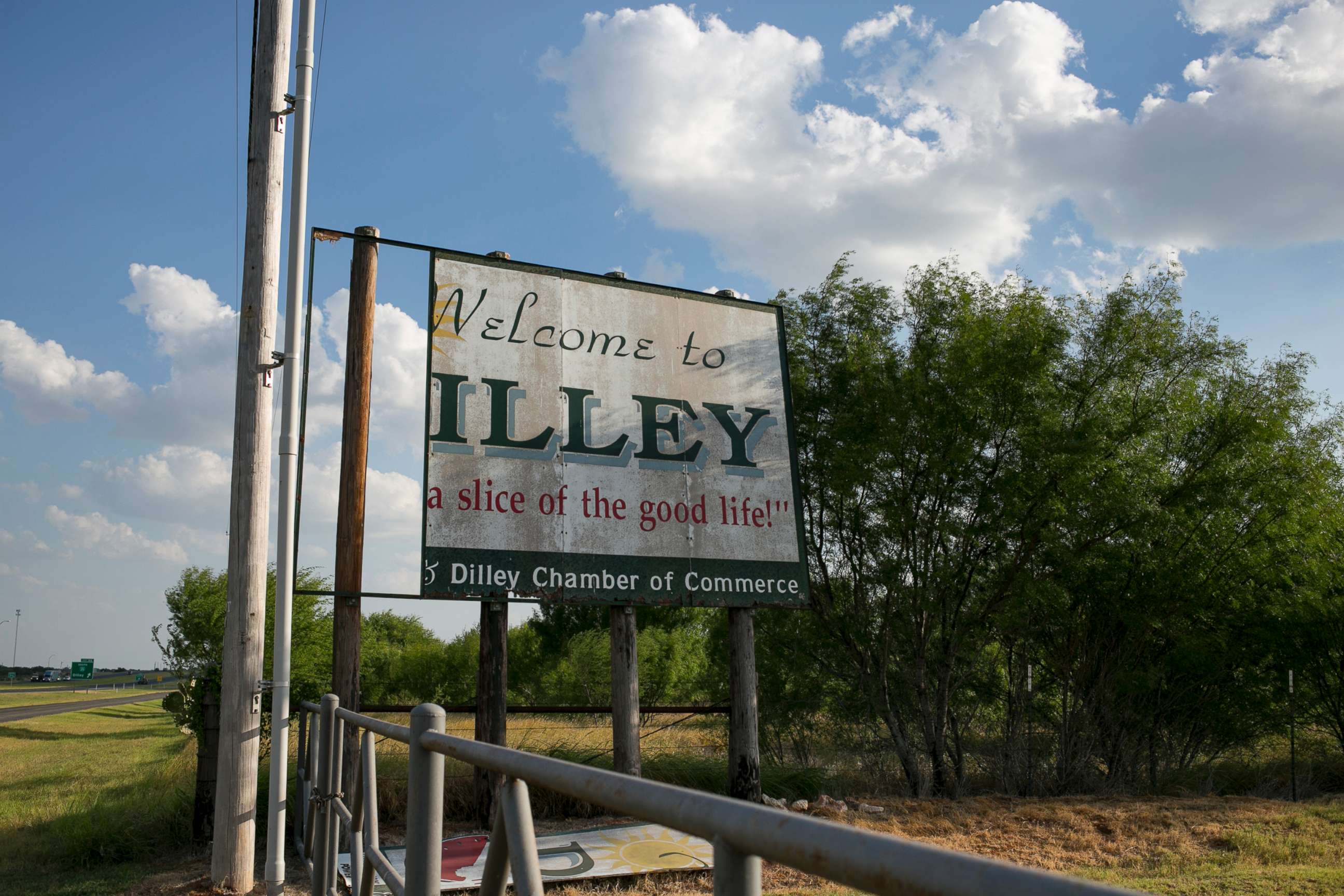10-year-old girl describes life in immigration detention: 'I began crying all of the time'
The girl, identified as Dixiana, 10, told her story in a sworn declaration.
A 10-year-old girl separated from her mother at the border described being kicked by a male officer, denied water, sleeping on the floor and crying "all of the time" while in immigration detention facilities in Texas, as part of a major lawsuit against Attorney General Jeff Sessions.
"I didn't cry the first day when I was at this facility, but I began crying all of the time on the second and third day because I missed my mother," Dixiana, 10, said in her sworn declaration. "The majority of the other girls in my cell were also crying the whole time I was there."
Dixiana, who is from Honduras, recounted memories of how she was treated and the conditions of her detention to an attorney on June 29, according to court documents. Her declaration is one of more than 200 included in Flores v. Sessions, a lawsuit filed in the U.S. District Court for the Central District of California.
Dixiana said in the declaration that she and her mother crossed the Rio Grande near Reynosa, Mexico, and were apprehended as they walked toward McAllen, Texas, on May 23. From there, she said they were taken to a facility she called the "Freezer," where she was separated from her mother.
A male officer kicked me to wake me up to confirm whether or not I was the person they were looking for. I was not.
"I was placed with female girls from 5 to 6 years old to 15 or 16 years old. There were large numbers of girls, some of whom had to sleep on concrete and sitting up because there wasn't sufficient room in the cell," Dixiana said in the declaration. "I slept on the floor in a passageway were [sic] I could find room. It was around midnight, and I was given an aluminum blanket. There were no mattresses."She described the bathroom conditions in the declaration.
"I had difficulty reaching the bathroom because I didn't want to push through other girls and wake them. When I did go to the bathroom, there was no door or separation between the toilets. The lights were on all night," Dixiana said.

After several hours at the facility, Dixiana said she began to cry.
"I was very scared I would never see my mother again. I cried. Most of the other girls with me were also crying. Another girl, who was about 16 or 17, had a baby and both her and the baby were crying," she said in her declaration.

Trump halted the separation of families at the border that were happening under his "zero tolerance" policy with an executive order on June 20. Now, detained children must be reunited with their parents. Trump's executive order also required Attorney General Sessions to ask the court to modify the Flores settlement, a framework that came about from the Flores v. Reno Supreme Court case in the 1990s. The Flores settlement established the rule that children could not be detained longer than 20 days and requires them to be placed in licensed facilities.
There were no windows, and I didn't know whether it was day or not. I asked what time it was when the officer told me I could see my mom at 6 p.m., but he said he was not permitted to tell me what time it was.
Earlier this month, U.S. District Judge Dolly Gee rejected the government's request to be released from the requirements in the Flores settlement. In her ruling, she called the request a "cynical attempt ... to shift responsibility to the judiciary for over 20 years of congressional inaction and ill-considered executive action that have led to the current stalemate."
In response, Justice Department Spokesman Devin O'Malley issued a statement on July 9.
"The Trump Administration continues to make good faith efforts that allow us to not only enforce the law, address the crisis of illegal immigration our border, and protect our nation and its citizens, but also protect the safety of children in government care and custody," O'Malley said in a statement.
"We disagree with the court’s ruling declining to amend the Flores Agreement to recognize the current crisis of families making the dangerous and unlawful journey across our southern border, but the court does appear to acknowledge that parents who cross the border will not be released and must choose between remaining in family custody with their children pending immigration proceedings or requesting separation from their children so the child may be placed with a sponsor. The Justice Department continues to review the ruling," O'Malley added.
The majority of the other girls in my cell were also crying the whole time I was there.
The Department of Justice did not immediately respond to ABC News' request for comment for this story.
The administration has said it's working to reunite immigrant children who have been taken from their parents at the border.
But that process has been criticized as slow and incomplete by some immigrants’ rights groups and the American Civil Liberties Union.
In late June, a federal judge in California set a 14-day deadline to reunite children under the age of 5 with their parents and a 30-day deadline for older children, the Associated Press reported.

But the government did not meet the deadline of reuniting all of the young children under 5 years old covered by the court order.
The deadline for reuniting all of the children is July 26. Lawmakers said today that Homeland Security Secretary Kirstjen Nielsen told them officials are on track to meet it.
The administration has previously argued they are working to meet the court deadline, but delays are necessary to ensure the safety and well-being of the children in their care.
"Our process may not be as quick as some would like, but there is no question that it is protecting children," said Chris Meekins, HHS chief of staff for the Office of the Assistant Secretary for Preparedness and Response. "The last thing we want to happen is that a child is placed in a dangerous situation due to a lack of a thorough review on our part."
In the meantime, Dixiana and other children in detention centers have described cold rooms, spoiled food, dirty toilets and cages crammed with young children to volunteer lawyers, interpreters and other legal workers who took their declarations as part of the Flores v. Sessions case.
After about 12 hours in the first location, Dixiana said she was put on a bus with her mother and transferred to another facility she called the "Dog House," according to her declaration. She was separated from her mother once more but could see her "far away in another cell," she said in the declaration. Then, she bathed and was given clean clothes.
"While I was in the cell with the bathed girls, I was half asleep and they were calling a girl who had a similar first name as me. A male officer kicked me to wake me up to confirm whether or not I was the person they were looking for," she continued. "I was not. The kick scared me and hurt, although I did not get a bruise."
By the second and third day at the facility, she began crying all the time and asking to see her mother, according to her declaration.
"A male officer told me I would be able to see my mother at 6 p.m. for an hour and to stop crying," Dixiana said in the declaration. "The lights were always on. There were no windows, and I didn't know whether it was day or not. I asked what time it was when the officer told me I could see my mom at 6 p.m., but he said he was not permitted to tell me what time it was. I never got to see my mom until we left the facility and I was put on a bus with my mom."
The Trump Administration continues to make good faith efforts that allow us to not only enforce the law, address the crisis of illegal immigration our border, and protect our nation and its citizens, but also protect the safety of children in government care and custody.
On May 28, according to her declaration, both Dixiana and her mother were transferred to the immigration and customs facility in Dilley, Texas, where they had been for more than a month when attorneys took Dixiana's statement. While there, Dixiana said she caught chicken pox.
George Humphrey, an attorney at Orrick, Herrington and Sutcliffe who translated Dixiana's declaration, said he was not able to say whether Dixiana is still in detention or speak more about her declaration because of attorney-client privilege.
But Peter Schey, an attorney for the children who filed the lawsuit, said that the children in detention are sharing what they have experienced through their declarations.
"They have spoken out loud and clear, and what they've said is they are experiencing enforced hunger, enforced dehydration, enforced sleeplessness," Schey told the Associated Press. "They are terrorized, and I think it is time for the courts and the public to hear their voices."
Schey did not respond to ABC News' request for comment.
For his part, Henry Moak, the chief accountability officer for U.S. Customs and Border Protection and the agency's court-appointed monitor, concluded that that the government was complying with the Flores agreement in a letter to Judge Gee filed on June 1.
Moak said his report was based on site visits between March 2 and May 31, before Dixiana's declaration was taken.
In his report, Moak acknowledged "concerns related to the potential disconnect between my observations and minors’ experiences, and related to ensuring the reliability of the data collected in CBP’s systems of record."
"Based on my personal observations and [Office of Accountability, Management Inspections Division's] recorded observations at CBP facilities along the southwest border, on-site interviews of minors and/or their parents, and subsequent review of minors’ custodial records, I conclude CBP continues to comply with the Agreement," Moak wrote.
ABC News’ Geneva Sands contributed to this report.




